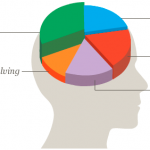Stress Reduction
It’s so easy to get sucked into the insane hustle and bustle of everyday life, and to let all the little annoyances we encounter ramp up our blood pressure, make us irritable, et cetera, and that can carry over into our home life, stressing our families without their understanding what’s going on.
 It’s very important we take enough time to be mentally and physically healthy, not only for the benefits to ourselves, but also to help take the best care of those who depend upon us.
It’s very important we take enough time to be mentally and physically healthy, not only for the benefits to ourselves, but also to help take the best care of those who depend upon us.
For me, years of letting society irk me took their toll mentally, physically and emotionally. When a friend was trying to teach me how to crochet and I kept ending up with knots or “not crochet,” she asked me simply, “why are you so tense?” The only answer I could think of was, “it’s the only way I know how to be.”
Tragic, right?
Finally, here in my forties, I am learning coping mechanisms, and I want to share these with you. These are not revolutionary, new ideas – some are thousands of years old, others are really common sense, but it’s easy to forget common sense when some jerk cuts you off in traffic, right?
Many of you might live in remote, rural areas, so some of these tips may not apply to you, but others will.
 The “Pay It Forward” concept – Isn’t it wonderful when someone does something spontaneously nice for you, just out of the blue? Whether it’s helping you with a door when your hands are full, or or simply giving a genuine smile when passing in the grocery store, it’s a warm feeling to experience kindness from a total stranger. It makes me feel good when I do it in return, as well – holding doors open, letting people merge into traffic, complimenting someone’s hand-made clothes or bag, et cetera. Somehow, we’ve gotten away from many of these daily pleasantries in modern society, especially in urban areas.
The “Pay It Forward” concept – Isn’t it wonderful when someone does something spontaneously nice for you, just out of the blue? Whether it’s helping you with a door when your hands are full, or or simply giving a genuine smile when passing in the grocery store, it’s a warm feeling to experience kindness from a total stranger. It makes me feel good when I do it in return, as well – holding doors open, letting people merge into traffic, complimenting someone’s hand-made clothes or bag, et cetera. Somehow, we’ve gotten away from many of these daily pleasantries in modern society, especially in urban areas.
 Be kind in traffic – I see such a powerful metaphor in one particular area of our local freeway system. Where Eastbound 496 has a single-lane exit for Southbound 127, there is often times an insane competition. We’ve all seen it before – there is a long line for an exit, and some folks either don’t understand what the line is for and unwittingly drive way past the end and try to find a kind soul to let them merge, while others are too impatient or “important” to get into the line at the end and speed to the last possible foot before dangerously cutting into the exiting traffic, while the people who have been in line do their level best to keep the inconsiderate person from getting ahead of them.This is all silly. If we work together, even accommodating those less considerate than ourselves, traffic will flow more smoothly and we’ll all be less stressed out. When I get into this particular exit lane, if there’s a lot of traffic, I leave a good 5 car lengths between me and the person ahead of me. I let as many people merge in front of me as want to, increasing the space again for each person who avails themselves of the opportunity to get in line.This sometimes infuriates the people behind me, but I usually get a grateful wave from the folks who are able to merge ahead of me. Traffic flows more smoothly, due to less congestion at the last possible moment, and fewer drivers going slowly or stopped completely in the right freeway lane. It’s a simple notion – don’t be competitive on the roads; the other drivers have someplace they want to be, and they’re not The Enemy – not even the real jerks. Let them do their thing, and carry on with your calm as intact as possible. “Keep calm and carry on!”
Be kind in traffic – I see such a powerful metaphor in one particular area of our local freeway system. Where Eastbound 496 has a single-lane exit for Southbound 127, there is often times an insane competition. We’ve all seen it before – there is a long line for an exit, and some folks either don’t understand what the line is for and unwittingly drive way past the end and try to find a kind soul to let them merge, while others are too impatient or “important” to get into the line at the end and speed to the last possible foot before dangerously cutting into the exiting traffic, while the people who have been in line do their level best to keep the inconsiderate person from getting ahead of them.This is all silly. If we work together, even accommodating those less considerate than ourselves, traffic will flow more smoothly and we’ll all be less stressed out. When I get into this particular exit lane, if there’s a lot of traffic, I leave a good 5 car lengths between me and the person ahead of me. I let as many people merge in front of me as want to, increasing the space again for each person who avails themselves of the opportunity to get in line.This sometimes infuriates the people behind me, but I usually get a grateful wave from the folks who are able to merge ahead of me. Traffic flows more smoothly, due to less congestion at the last possible moment, and fewer drivers going slowly or stopped completely in the right freeway lane. It’s a simple notion – don’t be competitive on the roads; the other drivers have someplace they want to be, and they’re not The Enemy – not even the real jerks. Let them do their thing, and carry on with your calm as intact as possible. “Keep calm and carry on!”
 This one sounds so hokey, but it’s so important: Breathe deeply. There is a reason this particular bit of advice has become cliche – because it works. We all obviously breathe, but most of us breathe shallowly, not fully engaging our diaphragms and abdomens – we breathe with our upper lungs and our shoulders. Simply taking one minute sit still and fully breathe can take a battered, stressed-out mind into a calmer place. It feels good physically, too, yet so many of us don’t take this easy, simple piece of advice – myself included! I often find myself hunched or slouched at my desk, my breaths short and shallow. Sitting up straight and taking full, deep breaths helps me to become more present and aware of my body.
This one sounds so hokey, but it’s so important: Breathe deeply. There is a reason this particular bit of advice has become cliche – because it works. We all obviously breathe, but most of us breathe shallowly, not fully engaging our diaphragms and abdomens – we breathe with our upper lungs and our shoulders. Simply taking one minute sit still and fully breathe can take a battered, stressed-out mind into a calmer place. It feels good physically, too, yet so many of us don’t take this easy, simple piece of advice – myself included! I often find myself hunched or slouched at my desk, my breaths short and shallow. Sitting up straight and taking full, deep breaths helps me to become more present and aware of my body.
 Meditation – One needn’t be Buddhist or even spiritual to find benefits from meditation. You can meditate for one minute or many hours, depending upon your needs and desires. You can meditate in a field or at your desk. In the tub or on the subway. I am no meditation master (far from it – I have a very active little monkey mind I have yet to conquer,) but you can learn oodles of excellent tips here, “How to Meditate,” or if you prefer a non-Buddhist site, here: “4 Powerful Reasons to Meditate and How To Get Started.” Meditation can be done sitting, lying, even walking, silently, with music, or with a mantra. Whatever helps to calm your mind and help you to feel relaxed is the right way for you.
Meditation – One needn’t be Buddhist or even spiritual to find benefits from meditation. You can meditate for one minute or many hours, depending upon your needs and desires. You can meditate in a field or at your desk. In the tub or on the subway. I am no meditation master (far from it – I have a very active little monkey mind I have yet to conquer,) but you can learn oodles of excellent tips here, “How to Meditate,” or if you prefer a non-Buddhist site, here: “4 Powerful Reasons to Meditate and How To Get Started.” Meditation can be done sitting, lying, even walking, silently, with music, or with a mantra. Whatever helps to calm your mind and help you to feel relaxed is the right way for you.
 Yoga – Despite being a physical activity (sometimes a really challenging one,) yoga relaxes the body and mind and helps to bring them together. I began doing yoga at least once a week, but fell out of the practice last year. I mean to take it up again, because it was wonderful – I felt great afterward, and during the session, whatever was eating away at my brain had to take a backseat to focusing on the movements and breathing.
Yoga – Despite being a physical activity (sometimes a really challenging one,) yoga relaxes the body and mind and helps to bring them together. I began doing yoga at least once a week, but fell out of the practice last year. I mean to take it up again, because it was wonderful – I felt great afterward, and during the session, whatever was eating away at my brain had to take a backseat to focusing on the movements and breathing.
 Use your body – Our bodies were designed to move, to engage and experience the world. Each of us has the ability to do so, even those with physical challenges. When I do nothing but sit at the computer all day, I usually feel no lifeforce, no energy, no motivation. It’s a nasty, self-perpetuating cycle, too – the less energy I feel I have, the less I want to get up and do something. In truth, the opposite is the case – if I feel apathetic, as soon as I get up and start doing something, I begin to feel better and more energized.You don’t need to go out and run 15 miles; engaging physically can be something as simple as going for a walk, cleaning the house, or working in the garden. Just get those muscles and joints moving! For those with physical challenges, it may be harder to find ways to engage, but I am certain there is something, whether it be simply sitting outside in the sun or shade and stretching in the sun, doing craftwork with your hands, chair dancing, fishing, or riding a specially-trained horse.
Use your body – Our bodies were designed to move, to engage and experience the world. Each of us has the ability to do so, even those with physical challenges. When I do nothing but sit at the computer all day, I usually feel no lifeforce, no energy, no motivation. It’s a nasty, self-perpetuating cycle, too – the less energy I feel I have, the less I want to get up and do something. In truth, the opposite is the case – if I feel apathetic, as soon as I get up and start doing something, I begin to feel better and more energized.You don’t need to go out and run 15 miles; engaging physically can be something as simple as going for a walk, cleaning the house, or working in the garden. Just get those muscles and joints moving! For those with physical challenges, it may be harder to find ways to engage, but I am certain there is something, whether it be simply sitting outside in the sun or shade and stretching in the sun, doing craftwork with your hands, chair dancing, fishing, or riding a specially-trained horse.
 Avoid chemical stimulants if possible – If you are prone to anxiety or stress, avoiding caffeine is a really good idea. This one is hard for me; my nervous system is often too wound up, but I do love a good cup of coffee. It’s hard to resist, but I’ve found since I switched to tea, my mood has evened out considerably.
Avoid chemical stimulants if possible – If you are prone to anxiety or stress, avoiding caffeine is a really good idea. This one is hard for me; my nervous system is often too wound up, but I do love a good cup of coffee. It’s hard to resist, but I’ve found since I switched to tea, my mood has evened out considerably.
 Eat real food – Our bodies and our brains function better when they have all the ingredients they need to perform their duties fully. Calories don’t equate to nutrition, and highly-processed and preserved foods are not designed to be digested – they are designed to have a shelf life. Everything most of us need can be found in whole foods – whether you believe God created us or we evolved from other primates, it stands to reason the foods we need can be found all around us. The trouble is, we are no longer hunter-gatherers, and so many of us eat foods out of boxes these days. We need to eat the foods for which our bodies are programmed to enjoy optimal health.
Eat real food – Our bodies and our brains function better when they have all the ingredients they need to perform their duties fully. Calories don’t equate to nutrition, and highly-processed and preserved foods are not designed to be digested – they are designed to have a shelf life. Everything most of us need can be found in whole foods – whether you believe God created us or we evolved from other primates, it stands to reason the foods we need can be found all around us. The trouble is, we are no longer hunter-gatherers, and so many of us eat foods out of boxes these days. We need to eat the foods for which our bodies are programmed to enjoy optimal health.
 Challenge your brain – Learning a new language is one of the best ways to get the old neurons firing up a storm, but working puzzles, finding patterns, playing music, or writing a story are all good methods of engaging our brains. There are a variety of sites out there offering brain games, such as Lumosity. My mother, who sustained a traumatic brain injury, uses Lumosity with great success.
Challenge your brain – Learning a new language is one of the best ways to get the old neurons firing up a storm, but working puzzles, finding patterns, playing music, or writing a story are all good methods of engaging our brains. There are a variety of sites out there offering brain games, such as Lumosity. My mother, who sustained a traumatic brain injury, uses Lumosity with great success.
 Take up a rewarding hobby – For a long time, when I had free time, I would play video games. While I enjoyed myself, I usually felt fairly hollow and unsatisfied. Even when nothing was going on with my group of gaming friends, I would putter around “in outer space,” doing busywork instead of coming back to Earth and doing something productive. I’ve cut games almost entirely out of my life at this point, and instead have been teaching myself how to knit, working on quilting ideas, organizing the house and other activities. When it’s warm out, I’ll start bicycling and motorcycling again. As with many aspects of life, I find balancing my hobbies difficult – balance doesn’t come naturally to me. I want to do everything all the time right now! There are too many things which interest me, and as a result, I often find myself spinning my tires in a rut of indecision, which makes me all the more anxious for not getting started. Just picking something and running with it for awhile helps my brain to unwind.
Take up a rewarding hobby – For a long time, when I had free time, I would play video games. While I enjoyed myself, I usually felt fairly hollow and unsatisfied. Even when nothing was going on with my group of gaming friends, I would putter around “in outer space,” doing busywork instead of coming back to Earth and doing something productive. I’ve cut games almost entirely out of my life at this point, and instead have been teaching myself how to knit, working on quilting ideas, organizing the house and other activities. When it’s warm out, I’ll start bicycling and motorcycling again. As with many aspects of life, I find balancing my hobbies difficult – balance doesn’t come naturally to me. I want to do everything all the time right now! There are too many things which interest me, and as a result, I often find myself spinning my tires in a rut of indecision, which makes me all the more anxious for not getting started. Just picking something and running with it for awhile helps my brain to unwind.
 Be kind to critters – This is a no-brainer for most of you, I’m sure, but extending this beyond our typical livestock animals or pets can be mentally beneficial, too. I am a lover of animals, every last stinking one of them. If I see a turtle crossing the road, I will always stop, pick it up and carry it across to the other side. If there are insects in my house that won’t bite us or that are otherwise harmless, they get to stick around – or at the very least, I gently capture them and place them outside. When I lived in Washington state, I would drive around the slugs on our little road as they meandered slowly across, minding their own sluggy little businesses. Most of the time, there’s no need to kill the insects we happen across. Their lives are just as important to them as ours are to us. The simple act of not needlessly killing something can make us feel good.
Be kind to critters – This is a no-brainer for most of you, I’m sure, but extending this beyond our typical livestock animals or pets can be mentally beneficial, too. I am a lover of animals, every last stinking one of them. If I see a turtle crossing the road, I will always stop, pick it up and carry it across to the other side. If there are insects in my house that won’t bite us or that are otherwise harmless, they get to stick around – or at the very least, I gently capture them and place them outside. When I lived in Washington state, I would drive around the slugs on our little road as they meandered slowly across, minding their own sluggy little businesses. Most of the time, there’s no need to kill the insects we happen across. Their lives are just as important to them as ours are to us. The simple act of not needlessly killing something can make us feel good.
 Reduce the clutter – Some of us are more sensitive to clutter than others. Personally, I think it affects me more than I realize. While I dislike clutter, I am often apathetic enough to let it pile up all around me, and I think the weight of it presses on my subconscious. This is particularly important for our working and resting spaces. Organizing them as best we can alleviates the somewhat claustrophobic feeling you may get. It can be hard to get started, especially if the clutter is a little (or a lot) out of control. Pick one small spot first, and either eliminate or organize what’s there. If you feel ready for more, pick another spot. If not, wait until you are, and in the meantime, try to keep that clean spot from accumulating more junk.
Reduce the clutter – Some of us are more sensitive to clutter than others. Personally, I think it affects me more than I realize. While I dislike clutter, I am often apathetic enough to let it pile up all around me, and I think the weight of it presses on my subconscious. This is particularly important for our working and resting spaces. Organizing them as best we can alleviates the somewhat claustrophobic feeling you may get. It can be hard to get started, especially if the clutter is a little (or a lot) out of control. Pick one small spot first, and either eliminate or organize what’s there. If you feel ready for more, pick another spot. If not, wait until you are, and in the meantime, try to keep that clean spot from accumulating more junk.
-
 Learn your own triggers – Be mindful of what “gets on your nerves,” “gets your goat,” “ramps you up,” or otherwise makes your blood pressure rise. When we become aware of our triggers, we can actively work to counteract them, either with an internal monologue about why we are becoming upset and how to let it go, or simply noting the behavior or trigger, and letting it pass through us.
Learn your own triggers – Be mindful of what “gets on your nerves,” “gets your goat,” “ramps you up,” or otherwise makes your blood pressure rise. When we become aware of our triggers, we can actively work to counteract them, either with an internal monologue about why we are becoming upset and how to let it go, or simply noting the behavior or trigger, and letting it pass through us.
I know I’ve gone on at considerable length here, and if you’re still reading you should probably receive some sort of award for patience and focus. Sadly, all I have to offer is my thanks, and a sincere hope you gained something beneficial from this article. Thank you!
What methods do you use for destressing? How do you counteract your emotional triggers?

